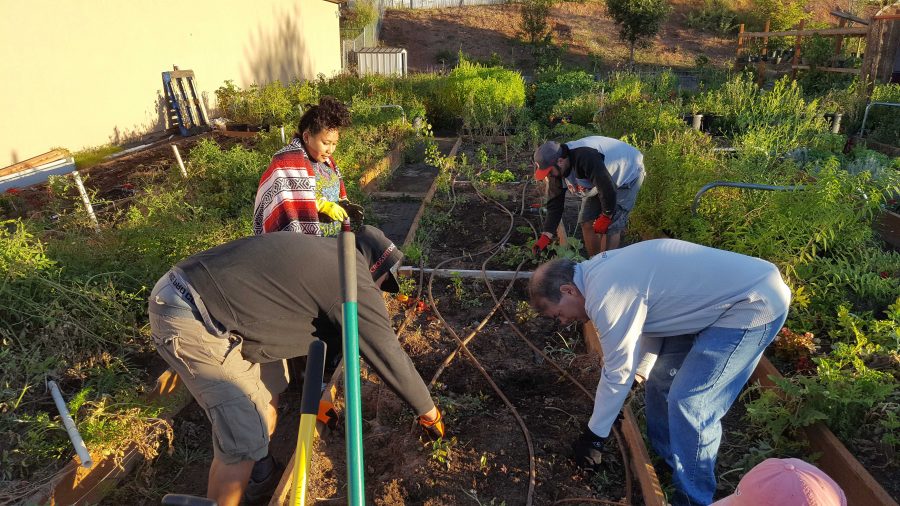Buening: Gardening Is a Form of Resistance
January 15, 2022
How often, when we purchase food from the store, do we stop and think about how it got there? For those of us that buy exclusively from supermarkets, probably not very often. But food is essential for survival and undoubtedly one of life’s greatest pleasures, so how we manage it is important.
Currently, our food system is dominated by corporate control. We have grown further away from the food we eat — physically, mentally and emotionally. Our relationship with food parallels a larger, troubling trend in our relationship with the environment. That is, we view ourselves as separate from nature rather than a part of it. And as industrialization has solidified this commodification of nature, we have lost sight of one of the most foundational, important systems — gardening.
Our food system has lost its taste for local produce, resulting in the deterioration of biodiversity, negative health impacts and further societal separation from ecological values. While it’s important that we don’t disrupt important food trading, we must address the ugly underbelly of agribusiness. As a form of resistance, and for the sake of our collective wellbeing, we need to reconnect with the food we eat. Local gardening can help us do that.
Current State of Our Food System
Although industrial agriculture increased crop yields, it also came with many negative consequences. Since agribusiness first exploded, it has continued to devastate family farmers and rural communities. These smaller-scale farms usually practice much more sustainable farming practices than those utilized by corporate production. Namely, large-scale businesses rely too heavily on monoculture, the cultivation of one crop species in a field at a time.
Monoculture relies on chemical use that strips away essential soil nutrients. The homogeneity of one species across a plot makes plants more vulnerable to pests and disease. Thus, even more fertilizers and pesticides are required to combat yield losses. These widespread applications of chemical treatments have led to the contamination of many freshwater ecosystems.
Monoculture farming also reduces crop biodiversity. While there are roughly 7,000 agricultural plant species, only 30 major ones “feed the world.” The drastic decrease in what foods fuel our diet has led to scientists freezing seed varieties in gene banks to prevent the extinction of crop species. Maintaining crop diversity is vital because crop varieties can better withstand challenges like climate change. It also helps to provide a wider variety of beneficial nutrients which, considering how processed grains from depleted soils have decreased the nutritional value of our food, we desperately need.
The food we grow also undergoes excessive transportation. The CUESA estimates that we put nearly 10kcal of fossil fuel energy into our food system for every 1kcal of energy we get as food. Likewise, the Worldwatch Institute found that the average full plate of food on an American table has traveled 1500 miles before getting there. Along the production line, hired agricultural and transportation workers are exploited and underpaid.
Resisting Commodification by Reconnecting
The many downfalls of our food system can be remedied by reconnecting with our environment. Disaster becomes inevitable while we maintain poor agricultural literacy. In 2017, 40% of California fourth-sixth graders didn’t even know that hamburgers came from cows. And today, as The Washington Post wrote, “many Americans only experience food as an industrial product that doesn’t look much like the original animal or plant.” So, we should encourage alternative ways through which we can experience food and, in the process, resist further environmental commodification.
A valuable way to introduce ecological values might be to integrate gardening in education. Salvaging ecological perspectives requires that we raise a generation better familiarized with the environment. I can say, as someone that spent part of my childhood on a family farm, that this kind of exposure is invaluable. Integrating gardening programs into elementary education has produced amazing results in institutions. Children, as young as toddlers, that participate in gardening develop a greater curiosity of, love for and connection with nature. It also provides a valuable way to increase physical activity and learn about biological processes.
Resisting environmental commodification extends beyond introducing gardening into education. By directly participating in local gardening and purchasing more from local sources, we can help decrease demand for unsustainable processes. Where we have plots of land, small or large, we might want to consider growing diverse landscapes of crops. In addition to the environmental benefits, working hands-on with the land brings major mental, physical and emotional benefits. For example, people that garden experience better moods, higher exposure to vitamin D and a decreased risk of dementia.
We cannot continue to disconnect from nature. We’ve seen how damaging that has been for people and the planet. Reconnecting with our food systems is a pivotal part of reconnecting with our environment as a whole. In so doing, we can resist the expansion of a dysfunctional system.









Nancy A. • Jan 18, 2022 at 8:10 pm
That’s why Farm to School and Farm to Institution are important programs. New England is doing a good job promoting local food. https://www.farmtoinstitution.org/
Utah could do the same. Buying regionally and locally-grown food provides healthy, nutritious options to the community, stimulates the local economy, and reduces impact on the environment by limiting food transportation. Farm to School programs also educate students and their families about making healthy eating choices and the science of plants.
Even with the numerous benefits of nature and gardening to health and well-being, it is difficult to get schools to change how they do things. This is especially true in public schools. I think it is a matter of parents putting pressure on their schools and districts to make changes. But, to do so, the parents need to know about the existence of school gardening programs and alternate sources available for acquiring the food they serve. The same goes for hospitals, senior centers, nursing homes, etc.
You’re right on the mark with your article, people of all ages are missing out by not connecting with nature.
FYI: SNAP (formerly food stamps) provides vouchers to purchase food from farmers’ markets.